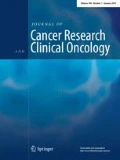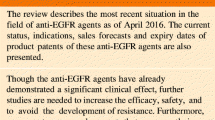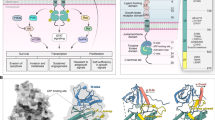Abstract
Targeted therapy refers to anticancer treatment which specifically targets key molecules of cancer cells and/or neovascular cells, aiming to thus interfere with processes of tumorigenesis, cancer progression and metastasis. The epidermal growth factor receptor (EGFR) was the first receptor to be proposed for targeted cancer therapy, having been found to be commonly overexpressed in a range of solid tumors and play a role in cancer cell proliferation, apoptosis, angiogenesis, invasion and metastasis. Despite successful development of EGFR-targeted pharmacological agents, clinical and molecular studies have indicated several limitations to the broad application of this treatment as a monotherapy. Novel combination treatments which might optimize the effect of EGFR inhibition have, therefore, been investigated. Research conducted into the mechanisms of action and synergy of these combination treatments is likely to enhance the role of the EGFR target in future cancer treatment.

Similar content being viewed by others
References
Amann J, Kalyankrishna S, Masson PP et al (2005) Aberrant epidermal growth factor receptor signaling and enhanced sensitivity to EGFR inhibitors in lung cancer. Cancer Res 65(1):226–235
Ariyama H, Qin B, Baba E et al (2006) Gefitinib, a selective EGFR tyrosine kinase inhibitor, induces apoptosis through activation of Bax in human gallbladder adenocarcinoma cells. J Cell Biochem 97(4):724–734. doi:10.1002/jcb.20678
Arora A, Scholar EM (2005) Role of tyrosine kinase inhibitors in cancer therapy. J Pharmacol Exp Ther 315(3):971–979. doi:10.1124/jpet.105.084145
Bareschino MA, Schettino C, Troiani T, Martinelli E, Morgillio F, Ciardiello F (2007) Erlotinib in cancer treatment. Ann Oncol 18(Suppl 6):vi35–vi41. doi:10.1093/annonc/mdm222
Boccellino M, Giuberti G, Quagliuolo L et al (2004) Apoptosis induced by interferon-α and antagonized by EGF is regulated by caspase-3-mediated cleavage of gelsolin in human epidermoid cancer cells. J Cell Physiol 201(1):73–83. doi:10.1002/jcp.20058
Bode B, Frigerio S, Behnke S et al (2006) Mutations in the tyrosine kinase domain of the EGFR gene are rare in synovial sarcoma. Mod Pathol 19(4):541–547. doi:10.1038/modpathol.3800560
Bruzzese F, Di Gennaro E, Avallone A et al (2006) Synergistic antitumor activity of epidermal growth factor receptor tyrosine kinase inhibitor gefitinib and IFN-alpha in head and neck cancer cells in vitro and in vivo. Clin Cancer Res 12(2):617–625. doi:10.1158/1078-0432.CCR-05-1671
Buck E, Eyzaguirre A, Brown E et al (2006a) Rapamycin synergizes with the epidermal growth factor receptor inhibitor erlotinib in non-small-cell lung, pancreatic, colon and breast tumors. Mol Cancer Ther 5(11):2676–2684. doi:10.1158/1535-7163.MCT-06-0166
Buck E, Eyzaguirre A, Haley JD, Gibson NW, Cagnoni P, Iwata KK (2006b) Inactivation of Akt by the epidermal growth factor receptor inhibitor erlotinib is mediated by HER-3 in pancreatic and colorectal tumor cell lines and contributes to erlotinib sensitivity. Mol Cancer Ther 5(8):2051–2059. doi:10.1158/1535-7163.MCT-06-0007
Caraglia M, Tagliaferri P, Marra M et al (2003) EGF activates an inducible survival response via the RAS-> ERK-1/2 pathway to counteract interferon-α mediated apoptosis in epidermoid cancer cells. Cell Death Differ 10(2):218–229. doi:10.1038/sj.cdd.4401131
Caraglia M, Tassone P, Marra M et al (2006) Targeting Raf-kinase: molecular rationales and translational issues. Ann Oncol 17(suppl 7):vii124–vii127. doi:10.1093/annonc/mdl964
Caraglia M, Marra M, Viscomi C et al (2007) The farnesyltransferase inhibitor R115777 (ZARNESTRA®) enhances the pro-apoptotic activity of interferon-α through the inhibition of multiple survival pathways. Int J Cancer 121:2317–2330. doi:10.1002/ijc.22964
Chada KC, Ambrus JL Jr, Dembinski W, Ambrus JL Sr (2004) Interferons and interferon inhibitory activity in disease and therapy. Exp Biol Med 229:285–290
Ciardiello F, Troiani T, Bianco R et al (2006) Interaction between the epidermal growth factor receptor (EGFR) and the vascular endothelial growth factor (VEGF) pathways: a rational approach for multi-target anticancer therapy. Ann Oncol 17:109–114. doi:10.1093/annonc/mdl962
Costa LJ, Drabkin HA (2007) Renal cell carcinoma: new developments in molecular biology and potential for targeted therapies. Oncologist 12:1404–1415. doi:10.1634/theoncologist.12-12-1404
Desbois-Mouthon C, Cacheux W, Blivet-Van Eggelpoël MJ et al (2006) Impact of IGF-1R/EGFR cross-talks on hepatoma cell sensitivity to gefitinib. Int J Cancer 119(11):2557–2566. doi:10.1002/ijc.22221
Douillard J-Y, Kim E, Hirsch V et al (2007) Gefitinib (IRESSA) versus docetaxel in patients with locally advanced or metastatic non-small-cell lung cancer pre-treated with platinum-based chemotherapy: a randomized, open-label Phase III study (INTEREST). J Thorac Oncol 2(8 Suppl 4):305 (PPS-02)
Dowlati A, Nethery D, Kern JA (2004) Combined inhibition of epidermal growth factor receptor and JAK/STAT pathways results in greater growth inhibition in vitro than single agent therapy. Mol Cancer Ther 3(4):459–463
Dudek AZ, Lesniewski-Kmak K, Shehadeh NJ et al (2009) Phase I study of bortezomib and cetuximab in patients with solid tumors expressing epidermal growth factor receptor. Br J Cancer 100:1379–1384. doi:10.1038/sj.bjc.6605043
Ellis LM, Hicklin DJ (2008) VEGF-targeted therapy: mechanisms of anti-tumor activity. Nat Rev Cancer. doi:10.1038/nrc2403
Ettinger DS (2006) Clinical implications of EGFR expression in the development and progression of solid tumors: focus on non-small cell lung cancer. Oncologist 11(4):358–373. doi:10.1634/theoncologist.11-4-358
Fischgräbe J, Wülfing P (2008) Targeted therapies in breast cancer: established drugs and recent developments. Curr Clin Pharmacol 3(2):85–98. doi:10.2174/157488408784293732
Fojo T (2008) Commentary: novel therapies for cancer: why dirty might be better. Oncologist 13:277–283. doi:10.1634/theoncologist.2007-0090
Frattini M, Saletti P, Romagnani E et al (2007) PTEN loss of expression predicts cetuximab efficacy in metastatic colorectal cancer patients. Br J Cancer 97:1139–1145. doi:10.1038/sj.bjc.6604009
Giaccone G (2005) HER1/EGFR-targeted agents: predicting the future for patients with unpredictable outcomes to therapy. Ann Oncol 16(4):538–548. doi:10.1093/annonc/mdi129
Gold KA, Lee HY, Kim ES (2009) Targeted therapies in squamous cell carcinoma of the head and neck. Cancer 115(5):922–935. doi:10.1002/cncr.24123
Gridelli C, Bareschino M, Schettino C, Rossi A, Maione P, Ciardiello F (2007) Erlotinib in non-small cell lung cancer treatment: current status. Oncologist 12(7):840–849. doi:10.1634/theoncologist.12-7-840
Herbst RS, Sandler A (2008) Bevacizumab and erlotinib: a promising new approach to the treatment of advanced NSCLC. Oncologist 13:1166–1176. doi:10.1634/theoncologist.2008-0108
Herbst RS, Fehrenbacher L, Belani CP et al (2007) Phase II study of efficacy and safety of bevacizumab in combination with chemotherapy or erlotinib compared with chemotherapy alone for treatment of recurrent or refractory non small-cell lung cancer. J Clin Oncol 25:4743–4750. doi:10.1200/JCO.2007.12.3026
Hida T, Ogawa S, Park JC et al (2009) Gefitinib for the treatment of non-small-cell lung cancer. Expert Rev Anticancer Ther 9(1):17–35. doi:10.1586/14737140.9.1.17
Huang S, Armstrong EA, Benavente S, Chinnaiyan P, Harari PM (2004) Dual-agent molecular targeting of the epidermal growth factor receptor (EGFR): combining anti-EGFR antibody with tyrosine kinase inhibitor. Cancer Res 64(15):5355–5362. doi:10.1158/0008-5472.CAN-04-0562
Huether A, Höpfner M, Sutter AP, Schuppan D, Scherübl H (2005) Erlotinib induces cell cycle arrest and apoptosis in hepatocellular cancer cells and enhances chemosensitivity towards cytostatics. J Hepatol 43(4):661–669. doi:10.1016/j.jhep.2005.02.040
Inamura K, Matsuzaki Y, Uematsu N, Honda A, Tanaka N, Uchida K (2005) Rapid inhibition of MAPK signaling and anti-proliferation effect via JAK/STAT signaling by interferon-α in hepatocellular carcinoma cell lines. Biochim Biophys Acta 1745(3):401–410. doi:10.1016/j.bbamcr.2005.06.003
Ishitsuka K, Hideshima T, Neri P et al (2008) p38 mitogen-activated protein kinase inhibitor LY2228820 enhances bortezomib-induced cytotoxicity and inhibits osteoclastogenesis in multiple-myeloma; therapeutic implications. Br J Haematol. doi:10.1111/j.1365-2141.2008.07044.x
Javle M, Hsueh C-T (2009) Updates in gastrointestinal oncology—insights from the 2008 44th annual meeting of the American Society of Clinical Oncology. J Hematol Oncol 2:9. doi:10.1186/1756-8722-2-9
Jonasch E, Haluska FG (2001) Interferon in oncological practice: review of interferon biology, clinical applications, and toxicities. Oncologist 6(1):34–55. doi:10.1634/theoncologist.6-1-34
Jung YD, Mansfield PF, Akagi M et al (2002) Effects of combination anti-vascular endothelial growth factor receptor and anti-epidermal growth factor receptor therapies on the growth of gastric cancer in a nude mouse model. Eur J Cancer 38:1133–1140. doi:10.1016/S0959-8049(02)00013-8
Kang JU, Koo SH, Kwon KC, Park JW, Jung SS (2008) Gain of the EGFR gene located on 7p12 is a frequent and early event in squamous cell carcinoma of the lung. Cancer Genet Cytogenet 184(1):31–37. doi:10.1016/j.cancergencyto.2008.03.002
Kasper B, Gil T, D’Hondt V, Gebhart M, Awada A (2007) Novel treatment strategies for soft tissue sarcoma. Crit Rev Oncol Hematol 62(1):9–15. doi:10.1016/j.critrevonc.2006.11.008
Kaulfuss S, Burfeind P, Gaedcke J, Scharf JG (2009) Dual silencing of insulin-like growth factor-I receptor and epidermal growth factor receptor in colorectal cancer cells is associated with decreased proliferation and enhanced apoptosis. Mol Cancer Ther 8(4):821–833. doi:10.1158/1535-7163.MCT-09-0058
Linardou H, Dahabreh I, Kanaloupiti D et al (2008) Assessment of somatic k-RAS mutations as a mechanism associated with resistance to EGFR-targeted agents: a systematic review and meta-analysis of studies in advanced non-small-cell lung cancer and metastatic colorectal cancer. Lancet Oncol 9:962–972. doi:10.1016/S1470-2045(08)70206-7
Ling YH, Li T, Yuan Z, Haigentz M Jr, Weber TK, Perez-Soler R (2007) Erlotinib, an effective epidermal growth factor receptor tyrosine kinase inhibitor, induces p27KIP1 up-regulation and nuclear translocation in association with cell growth inhibition and G1/S phase arrest in human non-small-cell lung cancer cell lines. Mol Pharmacol 72(2):248–258. doi:10.1124/mol.107.034827
Lynch TJ, Bell DW, Sordella R et al (2004) Activating mutations in the epidermal growth factor receptor underlying responsiveness of non-small-cell lung cancer to gefitinib. N Engl J Med 350(21):2129–2139. doi:10.1056/NEJMoa040938
Marshall J (2006) Clinical implications of the mechanism of epidermal growth factor receptor inhibitors. Cancer 107(6):1207–1218. doi:10.1002/cncr.22133
Maruyama R, Nishiwaki Y, Tamura T et al (2008) Phase III study, V-15-32, of gefitinib versus docetaxel in previously treated Japanese patients with non–small-cell lung cancer. J Clin Oncol 26:4233–4235. doi:10.1200/JCO.2007.15.0185
Matar P, Rojo F, Cassia R et al (2004) Combined epidermal growth factor receptor targeting with the tyrosine kinase inhibitor gefitinib (ZD1839) and the monoclonal antibody cetuximab (IMC-C225): superiority over single-agent receptor targeting. Clin Cancer Res 10(19):6487–6501. doi:10.1158/1078-0432.CCR-04-0870
Matsubara J, Yamada Y, Nakajima TE et al (2008) Clinical significance of insulin-like growth factor type 1 receptor and epidermal growth factor receptor in patients with advanced gastric cancer. Oncology 74(1–2):76–83. doi:10.1159/000139127
Matta A, Ralhan R (2009) Overview of current and future biologically based targeted therapies in head and neck squamous cell carcinoma. Head Neck Oncol 1:6. doi:10.1186/1758-3284-1-6
Mayer RJ (2009) Targeted therapy for advanced colorectal cancer—more is not always better. N Engl J Med 360(6):623–625. doi:10.1056/NEJMe0809343
Medina PJ, Goodin S (2008) Lapatinib: a dual inhibitor of human epidermal growth factor receptor tyrosine kinases. Clin Ther 30(8):1426–1447. doi:10.1016/j.clinthera.2008.08.008
Mendelsohn J, Baselga J (2006) Epidermal growth factor receptor targeting in cancer. Semin Oncol 33:369–385. doi:10.1053/j.seminoncol.2006.04.003
Moore MJ, Goldstein D, Hamm J (2007) Erlotinib plus gemcitabine compared with gemcitabine alone in patients with advanced pancreatic cancer: a phase III trial of the national cancer institute of Canada clinical trials group. J Clin Oncol 25:1960–1966. doi:10.1200/JCO.2006.07.9525
Morgillo F, Kim WY, Kim EW, Ciardiello F, Hong WK, Lee HY (2007) Implication of the insulin-like growth factor-1R pathway in the resistance of non-small cell lung cancer cells to treatment with gefitinib. Clin Cancer Res 13(9):2795–2803. doi:10.1158/1078-0432.CCR-06-2077
Murdoch D, Sager J (2008) Will targeted therapy hold its promise? An evidence-based review. Curr Opin Oncol 20:104–111. doi:10.1097/CCO.0b013e3282f44b12
Niho S, Ichinose Y, Tamura T et al (2007) Results of a randomized Phase III study to compare the overall survival of gefitinib (IRESSA) versus docetaxel in Japanese patients with non-small-cell lung cancer who failed one or two chemotherapy regimes. ASCO annual meeting proceedings Part 1. J Clin Oncol 25(18S) (LBA7509)
Ono M, Kuwano M (2006) Molecular mechanisms of epidermal growth factor receptor (EGFR) activation and response to gefitinib and other EGFR-targeting drugs. Clin Cancer Res 12(24):7242–7251. doi:10.1158/1078-0432.CCR-06-0646
Pao W, Miller VA, Politi KA et al (2005a) Acquired resistance of lung adenocarcinomas to gefitinib or erlotinib is associated with a second mutation in the EGFR kinase domain. PLoS Med 2(3):0225–0235
Pao W, Wang TY, Riely GJ et al (2005b) KRAS mutations and primary resistance of lung adenocarcinomas to gefitinib. PLoS Med 2(1):0057–0061
Perez-Soler R (2007) Erlotinib: recent clinical results and ongoing studies in non-small cell lung cancer. Clin Cancer Res 13(15 Pt 2):s4589–s4592. doi:10.1158/1078-0432.CCR-07-0541
Plosker GL, Figgitt DP (2003) Rituximab: a review of its use in non-Hodgkin’s lymphoma and chronic lymphocytic leukaemia. Drugs 63(8):803–843. doi:10.2165/00003495-200363080-00005
Qu XJ, Yang JL, Russell PJ, Goldstein D (2004) Changes in epidermal growth factor receptor expression in human bladder cancer cell lines following interferon-α treatment. J Urol 172(2):733–738. doi:10.1097/01.ju.0000130751.83953.55
Quesada AR, Medina MA, Alba E (2007) Playing only one instrument may be not enough: limitations and future of the antiangiogenic treatment of cancer. Bioessays 29:1159–1168. doi:10.1002/bies.20655
Quesnelle KM, Boehm AL, Grandis JR (2007) STAT-mediated EGFR signaling in cancer. J Cell Biochem 102(2):311–319. doi:10.1002/jcb.21475
Raja SM, Clubb RJ, Bhattacharyya M et al (2008) A combination of trastuzumab and 17-AAG induces enhanced ubiquitinylation and lysosomal pathway-dependant ErbB2 degradation and cytotoxicity in ErbB2-overexpressing breast cancer cells. Cancer Biol Ther 7(10):1630–1640
Reck M (2009) Gefitinib in the treatment of advanced non-small-cell lung cancer. Expert Rev Anticancer Ther 9(4):401–412. doi:10.1586/era.09.1
Ricciardi S, Tomao S, de Marinis F (2009) Toxicity of targeted therapy in non-small-cell lung cancer management. Clin Lung Cancer 10(1):28–35. doi:10.3816/CLC.2009.n.004
Riely GJ, Marks J, Pao W (2009) KRAS mutations in non-small cell lung cancer. Proc Am Thorac Soc 6:201–205. doi:10.1513/pats.200809-107LC
Saltz L (2008) Colorectal cancer treatment: what’s next? (or: is there life after EGFR and VEGF?). Gastrointest Cancer Res 2(Suppl 2):S20–S22
Schaefer G, Shao L, Totpal K, Akita RW (2007) Erlotinib directly inhibits HER2 kinase activation and downstream signaling events in intact cells lacking epidermal growth factor receptor expression. Cancer Res 67(3):1228–1238. doi:10.1158/0008-5472.CAN-06-3493
Sharma PS, Sharma R, Tyagi T (2009) Receptor tyrosine kinase inhibitors as potent weapons in war against cancers. Curr Pharm Des 15(7):758–776. doi:10.2174/138161209787582219
Siegel-Lakhai WS, Beijnen JH, Schellens JHM (2005) Current knowledge and future directions of the selective epidermal growth factor inhibitors erlotinib (Tarceva) and gefitinib (Iressa). Oncologist 10(8):579–589. doi:10.1634/theoncologist.10-8-579
Stinchcombe TE, Socinski MA (2009) Treatment paradigms for advanced stage non-small cell lung cancer in the era of multiple lines of therapy. J Thorac Oncol 4(2):243–250. doi:10.1097/JTO.0b013e31819516a6
Tagliaferri P, Caraglia M, Budillon A et al (2005) New pharmacokinetic and pharmacodynamic tools for interferon-alpha (IFN-α) treatment of human cancer. Cancer Immunol Immunother 54(1):1–10. doi:10.1007/s00262-004-0549-1
Thyrell L, Hjortsberg L, Arulampalam V et al (2004) Interferon-α-induced apoptosis in tumor cells is mediated through the phosphoinositide 3-kinase/mammalian target of rapamycin signaling pathway. J Biol Chem 279(23):24152–24162. doi:10.1074/jbc.M312219200
Tol J, Koopman M, Cats A et al (2009) Chemotherapy, bevacizumab, and cetuximab in metastatic colorectal cancer. N Engl J Med 360(6):563–572. doi:10.1056/NEJMoa0808268
Yang JL, Crowe PJ (2007) Targeted therapies in adult soft tissue sarcomas. J Surg Oncol 95(3):183–184. doi:10.1002/jso.20636
Yang JL, Qu XJ, Russell PJ, Goldstein D (2004) Regulation of epidermal growth factor receptor in human colon cancer cell lines by interferon α. Gut 53(1):123–129. doi:10.1136/gut.53.1.123
Yang JL, Qu XJ, Russell PJ, Goldstein D (2005a) Interferon-α promotes the anti-proliferative effect of gefitinib (ZD1839) on human colon cancer cell lines. Oncology 69(3):224–238. doi:10.1159/000088070
Yang JL, Qu XJ, Russell PJ, Goldstein D (2005b) Interferon-alpha promotes the anti-proliferative effect of erlotinib (OSI-774) on human colon cancer cell lines. Cancer Lett 225(1):61–74. doi:10.1016/j.canlet.2004.11.041
Yang JL, Hannan MT, Russell PJ, Crowe PJ (2006) Expression of HER1/EGFR protein in human soft tissue sarcomas. Eur J Surg Oncol 32(2):466–468. doi:10.1016/j.ejso.2006.01.012
Yang JL, Qu XJ, Hayes VM, Brenner PC, Russell PJ, Goldstein D (2007) Erlotinib (OSI-774)-induced inhibition of transitional cell carcinoma of bladder cell line growth is enhanced by interferon-α. BJU Int 99(6):1539–1545. doi:10.1111/j.1464-410X.2007.06778.x
Yarden Y (2001) The EGFR family and its ligands in human cancer: signaling mechanisms and therapeutic opportunities. Eur J Cancer 37(Suppl 4):S3–S8. doi:10.1016/S0959-8049(01)00230-1
Author information
Authors and Affiliations
Corresponding author
Rights and permissions
About this article
Cite this article
Zahorowska, B., Crowe, P.J. & Yang, JL. Combined therapies for cancer: a review of EGFR-targeted monotherapy and combination treatment with other drugs. J Cancer Res Clin Oncol 135, 1137–1148 (2009). https://doi.org/10.1007/s00432-009-0622-4
Received:
Accepted:
Published:
Issue Date:
DOI: https://doi.org/10.1007/s00432-009-0622-4




